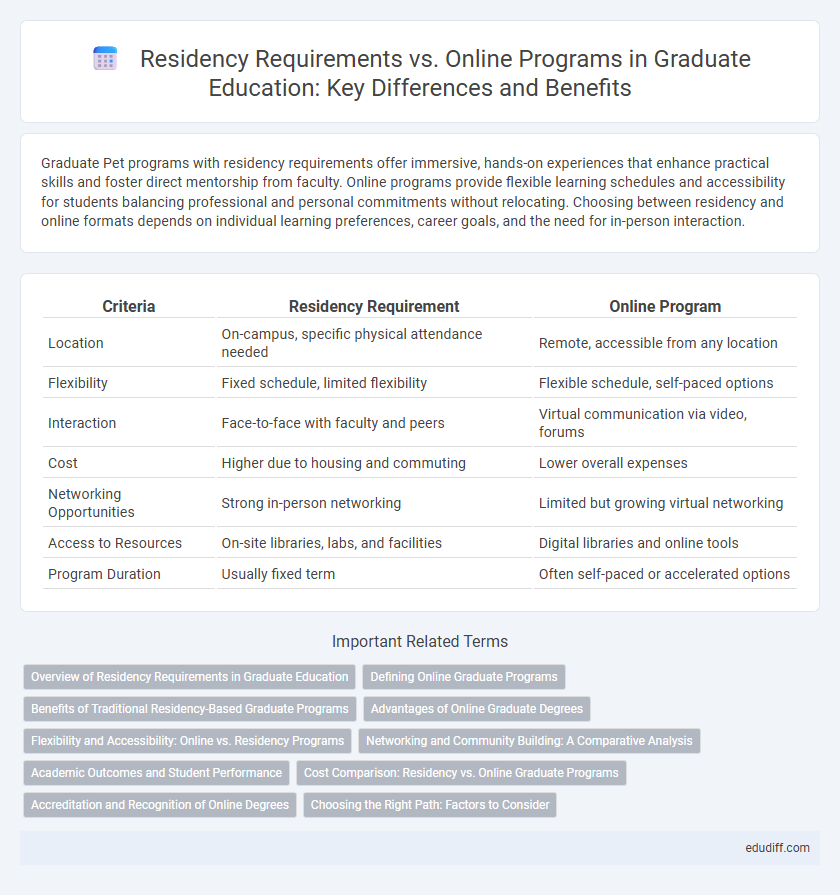Graduate Pet programs with residency requirements offer immersive, hands-on experiences that enhance practical skills and foster direct mentorship from faculty. Online programs provide flexible learning schedules and accessibility for students balancing professional and personal commitments without relocating. Choosing between residency and online formats depends on individual learning preferences, career goals, and the need for in-person interaction.
Table of Comparison
| Criteria | Residency Requirement | Online Program |
|---|---|---|
| Location | On-campus, specific physical attendance needed | Remote, accessible from any location |
| Flexibility | Fixed schedule, limited flexibility | Flexible schedule, self-paced options |
| Interaction | Face-to-face with faculty and peers | Virtual communication via video, forums |
| Cost | Higher due to housing and commuting | Lower overall expenses |
| Networking Opportunities | Strong in-person networking | Limited but growing virtual networking |
| Access to Resources | On-site libraries, labs, and facilities | Digital libraries and online tools |
| Program Duration | Usually fixed term | Often self-paced or accelerated options |
Overview of Residency Requirements in Graduate Education
Residency requirements in graduate education typically mandate on-campus attendance to ensure immersive, hands-on learning experiences and direct interaction with faculty and peers. These requirements vary by program but often include a minimum number of credit hours completed in person, fostering academic community engagement and research collaboration. In contrast, online programs offer flexibility but may lack mandatory residency components, emphasizing remote coursework and virtual interaction.
Defining Online Graduate Programs
Online graduate programs offer flexible learning opportunities by allowing students to complete coursework remotely without the need for physical residency on campus. These programs utilize digital platforms to deliver lectures, discussions, and assessments, catering to professionals who require adaptable schedules. Unlike traditional residency-based programs, online graduate programs eliminate geographic constraints, enabling access to graduate education worldwide.
Benefits of Traditional Residency-Based Graduate Programs
Traditional residency-based graduate programs offer immersive, hands-on learning experiences that foster direct collaboration with faculty and peers, enhancing practical skills and professional networking opportunities. These programs provide structured academic environments with immediate feedback, access to campus resources, and real-time discussions that deepen subject comprehension. The residency requirement also ensures disciplined study habits and engagement, which are crucial for mastering complex graduate-level material.
Advantages of Online Graduate Degrees
Online graduate degrees offer unparalleled flexibility, allowing students to balance coursework with professional and personal commitments without geographical constraints. These programs reduce costs related to commuting, housing, and campus fees, making advanced education more affordable and accessible. Access to a diverse range of courses and expert faculty from various locations enriches learning opportunities beyond traditional residency requirements.
Flexibility and Accessibility: Online vs. Residency Programs
Residency programs demand on-site attendance, limiting flexibility for graduates balancing work or family commitments, whereas online programs offer accessible learning from any location, accommodating diverse schedules. The physical presence required in residency programs enhances hands-on experience but restricts geographic freedom, while online programs provide extensive flexibility through asynchronous coursework and virtual interactions. Accessibility in online programs benefits international students and those in remote areas, contrasting with residency programs that typically require relocation or commuting.
Networking and Community Building: A Comparative Analysis
Residency requirements in graduate programs foster robust networking opportunities by facilitating face-to-face interactions, mentorship, and collaborative projects among peers and faculty. In contrast, online programs rely on virtual platforms, which, while flexible, often limit spontaneous engagement and the depth of community building compared to in-person experiences. The immersive environment of residency programs typically leads to stronger professional networks and a more cohesive academic community.
Academic Outcomes and Student Performance
Residency requirements often enhance academic outcomes by fostering immersive learning environments and direct faculty interaction, which contribute to higher student engagement and improved performance metrics. Online programs offer flexibility and accessibility but may face challenges such as limited peer collaboration and reduced hands-on experiences, potentially impacting the depth of learning and skill acquisition. Comparative studies indicate that while online graduates achieve comparable knowledge levels, residency components can lead to superior critical thinking and application skills in professional settings.
Cost Comparison: Residency vs. Online Graduate Programs
Residency graduate programs generally incur higher costs due to campus fees, housing, and commuting expenses, while online programs offer tuition savings with reduced or eliminated ancillary costs. Online graduate programs also provide flexibility that can decrease opportunity costs by allowing students to maintain employment during their studies. Comparing total expenses reveals online programs as a more cost-effective solution for many graduate students balancing financial and personal commitments.
Accreditation and Recognition of Online Degrees
Accreditation plays a crucial role in distinguishing reputable online programs from non-accredited ones, impacting the recognition of online degrees by employers and graduate schools. Residency requirements often emphasize on-campus participation to maintain academic rigor and institutional control, but accredited online degrees from recognized institutions are increasingly accepted in professional and academic settings. Verifying accreditation status through agencies approved by the Council for Higher Education Accreditation (CHEA) or the U.S. Department of Education ensures the online program meets quality standards comparable to traditional residency-based programs.
Choosing the Right Path: Factors to Consider
Graduate students must evaluate residency requirements and online program flexibility based on their career goals and learning preferences. Residency programs offer hands-on experience and networking opportunities crucial for fields requiring practical skills, while online programs provide accessibility and scheduling convenience ideal for working professionals. Assessing program accreditation, faculty expertise, and resource availability ensures the chosen path aligns with academic standards and long-term professional development.
Residency Requirement vs Online Program Infographic

 edudiff.com
edudiff.com